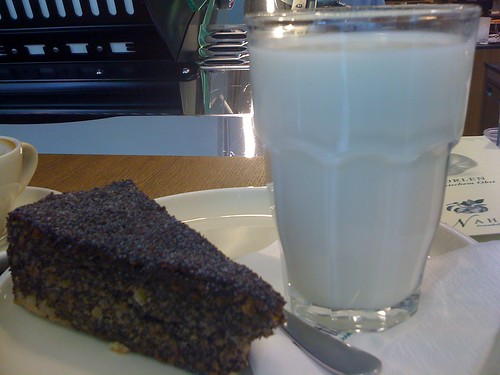
Over the last month or two I have taken time out from my afterwork curriculum to practice being a little bit more German. It's difficult to say what prompted this. For a long time I felt that I ended up in this country by accident rather than choice. For a few years, I felt comfortable as a citizen of no-place. But something seems to have shifted. I don't feel like I'll ever want to become German per se, but I finally feel at home enough that I allow myself a certain adopted pride for some of those quaint, old-fashioned customs... like making baked apples stuffed with rosehips, marzipan and hazelnuts, or autumn flower arrangements that include tiny crab apples.
After four years of living in Cologne, I've finally committed to my bicycle as a means of daily transport - using a 2nd hand foldable '50s klapprad to traverse the terrifyingly fast bicycle lanes and negotiate traffic (preferably with Erik alongside me as bikecoach).
In order to make my work-permit stick like glue, I recently participated in a nine-day state-subsidised integration course. I was hoping to be schooled in sausage varieties, but instead bonded with Phillipino, Jamaican, Dominican Republican and Kurdish classmates over parliamentary processes and Kentucky Fried Chicken.
At the start of the first day of our integration course, the tutor, a nice Turkish man named Herr Kaygisiz, asked us what we thought was typically German. Naturally, the first things that sprang to my mind were beer & cake.
Although I never drank beer before moving to Germany, I now enjoy a daily schwarzbier or pils. Unfortunately I don't like the local brew Kölsch so much.
Cake is a bit more difficult. Although my friends might deny it, cake still plays
an integral or even iconic role in the lives of young Germans. Our pals love to spend an occasional Sunday eating cake, drinking coffee and gossiping the afternoon away. Below is a picture of Carmen's birthday tea-break - a symphony of cake.

For my own part, I would usually rather eat a sandwich. Although I admire many German cakes - rustic, not too sweet, using yeasted bases and seasonal fruit like zwetschgen plums, or copious poppyseeds or light quark cheesecake formulas - I am not a committed cake fan.
Manufactum has one apple, walnut & poppyseed cake that I especially love (in photo below, with a crust of poppyseeds like purple volcanic sand). But I have never felt the need to bake a German cake.

I bake very rarely, and when I do it tends to be things like strawberry-lavender muffins, sweet potato pie, or blueberry-molasses cake, from Canadian or American books and websites. This is my habit generally when cooking - to make food I can't buy around the corner from my house. Variety is the spice of life, as they say, but of course going against the local culinary grain is also a way of satisfying nostalgia and creating a bubble in which to feel at home when you live abroad.
So for my birthday in early August, we made a nostalgic yum cha homage lunch: steamed buns, scallop shiu-mai, chinese broccoli and black sesame dumplings all made from scratch (to my chagrin it turned out Erik is much more talented at dumpling construction than me). It was a perfect lazy Sunday. And the German birthday cake that Ina brought along turned out to be the perfect dessert to follow this meal. A coconut-date cake, it was very light, fluffy and moist - so moist it was almost juicy in texture, rather than crumbly and cakey, and exactly as I like it: not too sweet.
Although I am quite keen to experiment with poppyseed-streaked muffins, if there is any cake that might start me on a path of German baking, I think it will be this delightful coconut-buttermilk-date cake.
INA'S COCOS-BUTTERMILK-DATE CAKE
Ingredients:
3 eggs
1 & 1/4 cups raw sugar (or more, to taste)
2 cups buttermilk
4 cups flour
22 g, 5.25 tsp or 1 & 1/2 packets of German baking powder (supposedly American/UK baking powder is 'double-acting', so you might use less than this recipe calls for - perhaps 4 teaspoons)
2 cups dessicated coconut
1/2 cup sugar (or more, to taste)
1/2 cup chopped dried dates
400 ml cream (or two 'becher' pottles)
Mix the first five ingredients together and pour into a greased pan. Mix the coconut, sugar and dates together and spread over the top. Bake for around 30 minutes at 140 degrees.
As soon as you remove it from the oven, pour 400 ml cream over top and let cool.
You could try it with beer I guess, but we enjoyed it with a 2008 Rheinhesser Grauer Burgunder (a dry Pinot Grigio). The cake-baker is pictured with her family below.






